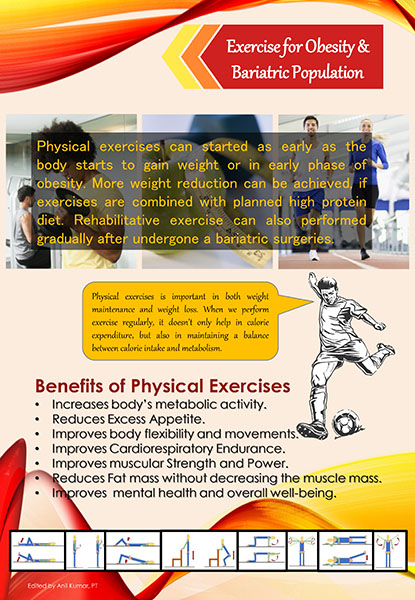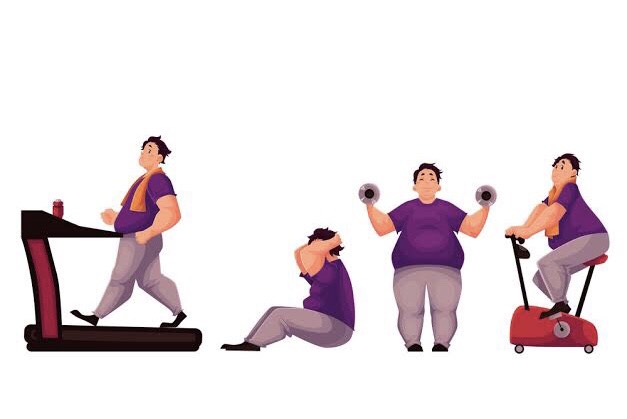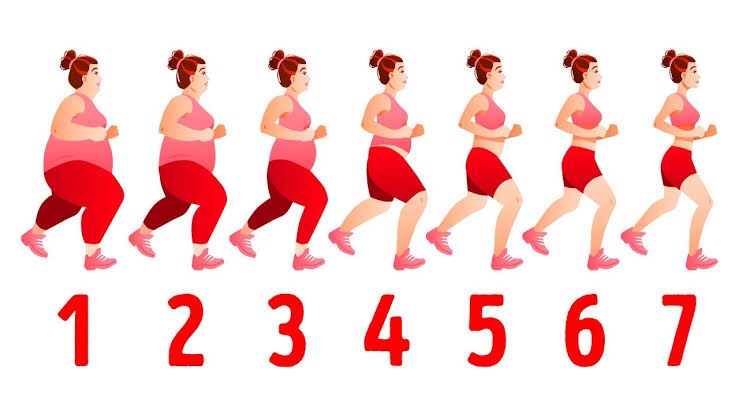
POST BARIATRIC SURGERY EXERCISE
INTRODUCTION
Bariatric is the treatment and prevention of obesity. Bariatric treatments range from diet, exercise and behavioral therapy, to medications and surgery. Our goal is to help each patient achieve greater health and an improved quality of life. It has now been proven that obesity is a significant contributor to your chances of developing diabetes. It is also well known that losing weight can reduce blood sugar levels and improve or possibly reverse diabetes. It has been reported by the Centers for Disease Control that even a modest 5% – 7% reduction in body weight can greatly improve your body’s sensitivity to insulin. That means you will probably need less medication for your diabetes and, in many cases, the onset of Type 2 diabetes can be delayed and possibly even prevented. Most obese people have tried to lose weight hundreds of time but have not been able to keep it off and have always gained it all back.
So for those people who are facing both an inability to lose weight and life-threatening diabetes, bariatric surgery might be the best choice. Having the surgery has helped many obese people lose weight and lower their risk for stroke, heart disease, diabetes and an early death.
NECESSITY OF POST BARIATRIC EXERCISES
If you can maintain a healthy weight, eat well and exercise, it is very possible that you can live the same life as others live. To have the best life after bariatric surgery, you will need to commit to a healthy diet and a consistent bariatric Exercises regime so you can maximize your weight loss and feel better than ever. Yoga, walking, dancing, swimming, cycling, jogging, aerobics classes and light weights are also popular after bariatric surgery. Exercise can help you lose more weight and keep it off after surgery. Exercise produces endorphins that help you combat anxiety. It creates more blood flow to the brain, breaks the brain’s downward spirals into depression and anxiety, and produces endorphins that help to regulate and improve your mood.


BENEFITS OF EXERCISES AFTER BARIATRIC SURGERY
A healthy lifestyle incorporating an exercise programme will offer you many benefits-
- Maintaining weight loss
- Boosting your metabolism
- Reducing your risk of developing heart disease and some types of cancer
- Enhancing your self-esteem and confidence
- Helping develop and maintain muscle strength, endurance and tone
- Promoting joint stability, bone strength and integrity
- Aiding your ability to perform daily living activities
- Improving your skin elasticity
- Elevating your mood, reducing stress and anxiety
- Improving your overall health, well-being and mental outlook
WHEN & HOW TO START EXERCISING
Right After Bariatric Surgery: Take It Slow
It’s important to start gentle, slow walks the day after surgery. Remember: your body is still recovering, so it’s important to listen to your body and your medical team. Don’t walk for more than 15 minutes at a time.
2-4 Weeks After Bariatric Surgery: Light Exercise
Now that your body’s healing, you can start low-impact bariatric exercises. Leg lifts, hamstring stretches, shoulder rolls, and arm rotations can be great ways to build strength and flexibility. You can also start going on longer walks, or walking more quickly.
Exercising 1-2 Months After Bariatric Surgery: Cardio
As your body continues to heal and strengthen, it’s important to build to moderate cardio workouts. Cycling and water workouts are both great exercises after bariatric surgery that are easier on your joints than running. You should start aiming to work out 5 days a week, for 30 minutes per day and build from there.
Exercising 6 Weeks After Weight Loss Surgery: Strength Training
At this point, it’s important to start adding strength training to your workout routine at least 2 days per week. Squats and lunges are great bariatric exercises. So is lifting weights. But please keep in mind, that it’s important to only respect your body’s injury go exercise up to your pain threshold limit for exercise.

Which areas one should focus for the exercises after Bariatric Surgery?
After surgery, there are three key areas you should focus on when it comes to exercise.
- Cardio
- Strength training
- Flexibility

CARDIO: Burning Calories and Giving You More Energy
also produces endorphins, which can increase your confidence. It strengthens your heart and lungs, increases bone density which is important to ward off arthritis, and also boosts your mental sharpness and ability to focus.
What are some great Cardio Bariatric exercise?
Early after surgery, walking is recommended as it decreases complications and improves your recovery. Eventually, water workouts and swimming can be very good low impact options. Running or hiking a beautiful Colorado trail are very invigorating outdoor options.

CALORIES USED IN 20 MINUTES OF DIFFERENT ACTIVITIES
| Activity | Calories | Activity | Calories |
|---|---|---|---|
| Walking-2 mph | 83 | Basketball(moderate) | 124 |
| Walking-4.5 mph | 100 | Dancing | 105 |
| Golf | 85 | Housework | 63 |
| Skipping rope | 245 | Swimming-800 yards | 152 |
| Yardwork | 54 | Ice Skating | 100 |
| Mowing lawn | 150 | Washing car | 65 |
| Cycling | 135 | Running | 190 |
Strength Training: Keeping Your Lean Muscle Mass
Strength training is important to help you maintain your lean muscle mass. By maintaining your muscle mass you are also maintaining your body’s calorie burning engine.
What are some great Strength Training Bariatric exercise?
Lunges, squats, and lifting weights are all great bariatric exercises for strength training. Sit-ups, crunches or other core exercises can also be an excellent toning exercise after bariatric surgery and can produce greater core strength to prevent future injuries.
FLEXIBILITY: Preventing Injuries
Flexibility training is important to help you avoid injuring yourself. If you feel sore or tight after your bariatric workout, flexibility training can help.
What are some great Flexibility Bariatric exercise?
Stretching is a great flexibility workout. When you’re stretching, it’s important to be careful. Take each stretch slowly and hold it for ten seconds–don’t bounce up and down. Go far enough that you feel a burn, but pull back if you feel sharp pain.
SOME RESEARCH TALKING
A recent meta-analysis found that consistent exercise for bariatric surgery patients leads to a 4.2% lower body mass index.
A study of gastric bypass patients showed that those who exercised lost at least 10-15 pounds more than those who did not.
Another study compared the weight loss of gastric bypass surgery patients who completed moderately intense physical activity for a minimum of 2 ½ hours per week against those who did not. The 2 ½ hours per week patients showed significantly greater weight loss.
6 months after surgery – 5.5% greater excess weight loss (56.0% vs. 50.5%)
12 months after surgery – 5.7% greater excess weight loss (67.4% vs. 61.7%)
CONCLUSION
“Exercise is a safe and effective way of maintaining lean body mass, which maintains metabolism and will facilitate weight loss.When you lose weight, your body will naturally eliminate both fat and muscle. It’s important to exercise after bariatric surgery so you can preserve your lean muscle. That way, you’ll keep enough muscle to stay healthy.”
